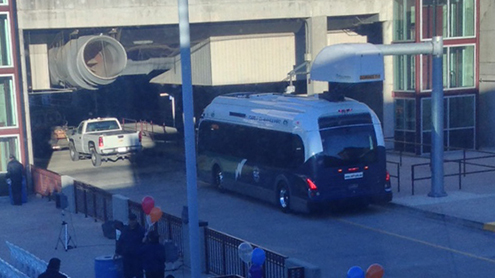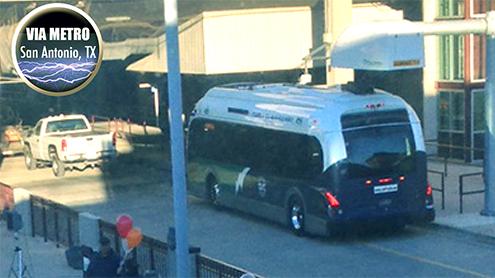
The Proterra-made battery-electric bus fleet began service in late February
 Proterra Inc., maker of the world’s first battery-electric fast-charge transit bus, the EcoRide, has added San Antonio, TX, to the list of cities currently operating its buses. San Antonio’s VIA Metropolitan’s Proterra-made 100 percent battery-electric bus fleet, called the Arc, went into service in late February.
Proterra Inc., maker of the world’s first battery-electric fast-charge transit bus, the EcoRide, has added San Antonio, TX, to the list of cities currently operating its buses. San Antonio’s VIA Metropolitan’s Proterra-made 100 percent battery-electric bus fleet, called the Arc, went into service in late February.
The three composite body buses will operate on VIA’s downtown circulator routes, and they will be recharged at the Robert Thompson Transit Station at the Alamodome.
As the batteries are charged, they will receive energy that is generated either by solar panels installed as part of the project or by turbines in West Texas wind farms as part of VIA’s Windtricity agreement with CPS Energy.
“VIA is excited to have the opportunity to bring electric buses to San Antonio,” said Jeffrey Arndt, VIA’s interim president and CEO. “The Arc service marks a first for VIA as we introduce a completely emissions-free way to provide transit service to the central business district.”
Proterra executives have worked closely with VIA Metropolitan and the San Antonio community on this new electric bus project, and Proterra’s CEO David Bennett and Vice President of Sales and Marketing Ian Shackleton attended the official launch ceremony on Tuesday, February 26.
“As the cleanest, most fuel efficient and lowest total cost of ownership option in the transit market, Proterra’s battery-electric buses are the natural choice for transit agencies struggling to balance budget constraints, ever-increasing fuel costs and mounting sustainability pressures,” said David Bennett. “We are thrilled to see our buses go into service in another community and proud to have worked closely with VIA Metropolitan to take this critical step forward. We look forward to having our buses in service there for many years to come and to pointing to San Antonio’s success to lead other agencies to take similar steps toward the future of transit.” BR
